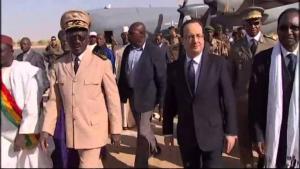While the unfortunate Paris attacks have played into the hands of Francois Hollande, the recent siege of a hotel In Mali’s capital Bamako,which left scores dead, is almost a godsend for the French president to push his agenda.
Paris attacks have empowered Hollande to impose emergency in the country, earn his people’s mandate to carry out a blitzkrieg in Syria and ensure that Russia wouldn’t walk away with all the credit and strategic advantage once the mayhem is over.
The hotel siege in Mali by Jihadists has allowed France to dispatch an elite paramilitary group to the troubled spot and thus dig its heel deep into Africa where it had been a colonial master in the past and where it continues to covet assets and resources through its “Operation Barkhane.”
“Opeation Barkhane” has a prelude which must be explained to readers who understandably are handicapped by the media blackout on the situation at the ground.
“Operation Barkhane” has followed on to the heels of “Operation Serval.” The latter was conducted by thousands of French troops in 2013,at the “request” of the Mali government to stop insurgency and jihadist attacks in the northern region of the country.
In due course, the French defence minister announced that “Operation Serval” was successful. But France wasn’t getting out of Mali.
Strangely, French forces who drove insurgents out to Sahel desert from all corners, left their infrastructure intact in Kidal, the central city of the northern Azawad region. This territory is practically under control of MNLA (National Movement for Liberation of the Azawad).
France not only allowed rebels to occupy the area and reorganize, they also ensured MLNA a seat in the post-war negotiation table. MLNA has been given a highly romanticized image of the rebels in French media. MNLA leaders frequently visit French TV stations.
Why is MNLA important for France? Because France needs its own militant group in the region, like other Western and Middle East nations have theirs, as the race for Africa’s assets reached a feverish pitch.
France badly needs Niger, at the east border of Mali, and can’t allow it to fall into rival jihadist groups. Niger is world’s fourth largest producer of uranium and France generates more than 75 per cent of its electricity through nuclear plants.
Thus comes “Operation Barkhane.” The new operation is based from Chad and covers Mali, Burkina Faso, Mauritania and Niger.
There is a reason why Chad is the base camp of “Operation Barkhane.” Chad has a long history of hosting French military operations in the continent. Starting from 1968, the association was renewed in 1986 against Muammar Qaddafi of Libya who was invading from the north. France’s history in Africa has followed a similar pattern. Some excuses are found to deploy forces on the ground to protect its economic interests and occupy strategic areas, from Djibouti to Ivory Coast.
Mali was one nation which had resisted France’s intervention from the days of its first president Modilbo Keita in 1961. The presidents who followed—Moussa Traore, Alpha Qumar Konare and Ambadou Toumany Toure—were similar in resolve. The trend was bucked when the present Mali government asked France to intervene following insurgency crisis in 2012.
The US of course is siding with the French in the mission and providing support through its drone operations from Niger’s capital. US defence secretary Leon Panetta has confirmed that US was providing intelligence to French troops in Mali. Canada, Belgium (!), Denmark and Germany have also publicly endorsed the French incursion and promised logistical support.
That France is risking lives of its own soldiers in a faraway African land should tell you something. The facts below would give you the exact reasons why Mali is so critically important for France:
GOLD: Mali is Africa’s third largest gold producer. It has always been so. Once its emperor Kankou Moussa went on a pilgrimage to Mecca with more than 8 tonnes of gold in his caravan!
URANIUM: Explorations are presently on on various sites of Mali and signs are extremely encouraging. Uranium potential in Falea alone is thought to be 5000 tonnes. Gao region is expected to yield 200 tonnes.
DIAMONDS: In the Kayes region, 30 kimberlitic pipe have been discovered of which eight are laced with diamonds. Precious stones have been found in various regions.
IRON, ORE, BAUXITE AND MANGANESE: Mali is believed to have at least 2 million tones of potential irore ore reserves located in the areas of Djidian-Kenieba, Diamou and Bale. Bauxite reserves are said to be 1.2 million tones.
Large resources of copper, phosphate, lead, zin, lithium, lignite and rock salt are also confirmed in various regions of the country.
Mali’s petroleum potential has already been well documented since the 1970s. Mali could also provide a strategic transport route for Sub-Saharan oil and gas exports through to the Western world and connecting the Taoudeni basin to European market through Algeria.
So there you have it. An official at the French ministry told media following French elecdtions in May 2012: “When the outgoing government passed over the (foreign affairs) files, Mali was on the top of the pile.”
Babacar Justin Ndjaye, an influential military analyst in West Africa has pointed out: “Mali was intentionally weakened to prepare the French military operation “Serval” which in turn has prepared the ground for “Operation Barkhane.”
Jeremy Keenan, author and professor at the School of Oriental and African Studies, University of London, detailed so in a December 2012 article, titled: “How Washinigton helped foster the Islamist uprising in Mali.” Writes Keenan: “the catastrophe now being played out in Mali is the inevitable outcome of the way in which the Global War on Terror (GWOT) has been inserted into the Sahara-Sahel by the US in concert with Alergian intelligence operatives since 2002.”
Imperialism and colonialism always thrive on capturing other nations’ land, labour and resources. What is being done to Greece, Portugal, Spain and Ireland through debt trap, is being repeated in Mali through bombs and bullets.


